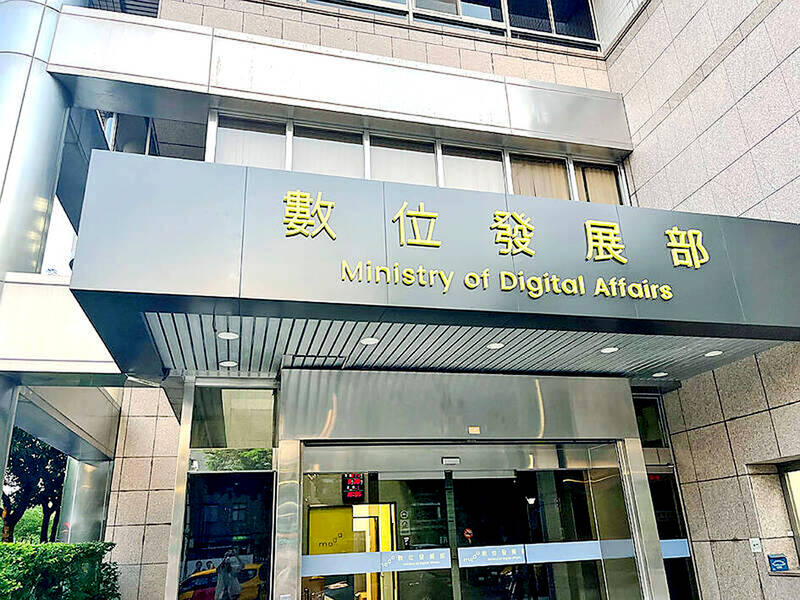The Ministry of Digital Affairs (MODA) is planning to spend NT$100 million (US$3.12 million) next year to purchase artificial intelligence (AI) graphics processing units (GPUs) and facilitate an AI computing platform.
The NT$100 million would also be used to improve cybersecurity as part of the AI computing platform, the ministry said yesterday.
The platform would be particularly important for start-ups and smaller companies, a ministry official said.

Photo: Hsu Tzu-ling, Taipei Times
The ministry has selected 64 qualified applicants since it started accepting applications to use the AI computing platform in July, more than half of which are start-ups, the official said.
The plan to buy no fewer than 70 GPUs next year would allow the qualified applicants to use them for free, the official added.
Minister of Digital Affairs Yennun Huang (黃彥男) in a recent interview said that many small and medium-sized enterprises (SMEs) faced difficulties in developing AI computing because of the huge expense and their limited capital, making government help a must, the official said.
Depending on the specification, an AI GPU can cost thousands or tens of thousands of US dollars.
If some SMEs and start-ups are allowed to use the GPUs for free as part of the ministry’s AI computing platform, they would be able to develop products on a trial basis to find commercial value, Huang said.
The AI computing platform is part of the ministry’s four-year cross-domain digital public infrastructure and digital services ascendancy program, the ministry said.
It is aimed at laying a sound foundation for the local software industry to develop AI applications for commercial use and boost Taiwan’s competitiveness in the digital sector, the ministry added.
This year, the ministry’s Administration for Digital Industries bought 32 advanced H100 central processing units from US-based AI chip designer Nvidia Corp and eight sophisticated MI300X GPUs from Advanced Micro Devices, another US-based AI GPU designer, to assist SMEs and start-ups.
The planned purchase of an additional 70 GPUs would inject new momentum into the AI computing platform, in which qualified applicants would be allowed to use these devices owned by the platform for six weeks, free of charge, the ministry said.
The 64 qualified applicants as part of the AI computing platform are expected to develop their AI applications in a wide range of fields, including philanthropy, education, healthcare, disaster prevention, manufacturing and transportation, the ministry said.
One of the successful applicants wants to develop a multi-language translation device by integrating Mandarin, Hoklo, Hakka and Southeast Asian languages such as Thai and Indonesian languages into a database, to help immigrants in Taiwan communicate more easily, the ministry said.
Another successful applicant wants to use data from more than 170,000 reports on rainfall volume, sewage capacity and flood records to build a model that can predict flooding, the ministry said.
A third applicant is hoping to strengthen enforcement of environmental protection laws by setting up an air pollution prevention model powered by AI technologies, the ministry said.

TRAFFIC SAFETY RULES: A positive result in a drug test would result in a two-year license suspension for the driver and vehicle, and a fine of up to NT$180,000 The Ministry of Transportation and Communications is to authorize police to conduct roadside saliva tests by the end of the year to deter people from driving while under the influence of narcotics, it said yesterday. The ministry last month unveiled a draft of amended regulations governing traffic safety rules and penalties, which included provisions empowering police to conduct mandatory saliva tests on drivers. While currently rules authorize police to use oral fluid testing kits for signs of drug use, they do not establish penalties for noncompliance or operating procedures for officers to follow, the ministry said. The proposed changes to the regulations require

Taipei, New Taipei City, Keelung and Taoyuan would issue a decision at 8pm on whether to cancel work and school tomorrow due to forecasted heavy rain, Keelung Mayor Hsieh Kuo-liang (謝國樑) said today. Hsieh told reporters that absent some pressing reason, the four northern cities would announce the decision jointly at 8pm. Keelung is expected to receive between 300mm and 490mm of rain in the period from 2pm today through 2pm tomorrow, Central Weather Administration data showed. Keelung City Government regulations stipulate that school and work can be canceled if rain totals in mountainous or low-elevation areas are forecast to exceed 350mm in

1.4nm WAFERS: While TSMC is gearing up to expand its overseas production, it would also continue to invest in Taiwan, company chairman and CEO C.C. Wei said Taiwan Semiconductor Manufacturing Co (TSMC) has applied for permission to construct a new plant in the Central Taiwan Science Park (中部科學園區), which it would use for the production of new high-speed wafers, the National Science and Technology Council said yesterday. The council, which supervises three major science parks in Taiwan, confirmed that the Central Taiwan Science Park Bureau had received an application on Friday from TSMC, the world’s largest contract chipmaker, to commence work on the new A14 fab. A14 technology, a 1.4 nanometer (nm) process, is designed to drive artificial intelligence transformation by enabling faster computing and greater power

China Airlines Ltd (CAL) yesterday morning joined SkyTeam’s Aviation Challenge for the fourth time, operating a demonstration flight for “net zero carbon emissions” from Taiwan Taoyuan International Airport to Bangkok. The flight used sustainable aviation fuel (SAF) at a ratio of up to 40 percent, the highest proportion CAL has achieved to date, the nation’s largest carrier said. Since April, SAF has become available to Taiwanese international carriers at Taipei International Airport (Songshan airport), Kaohsiung International Airport and Taoyuan airport. In previous challenges, CAL operated “net zero carbon emission flights” to Singapore and Japan. At a ceremony at Taoyuan airport, China Airlines chief sustainability